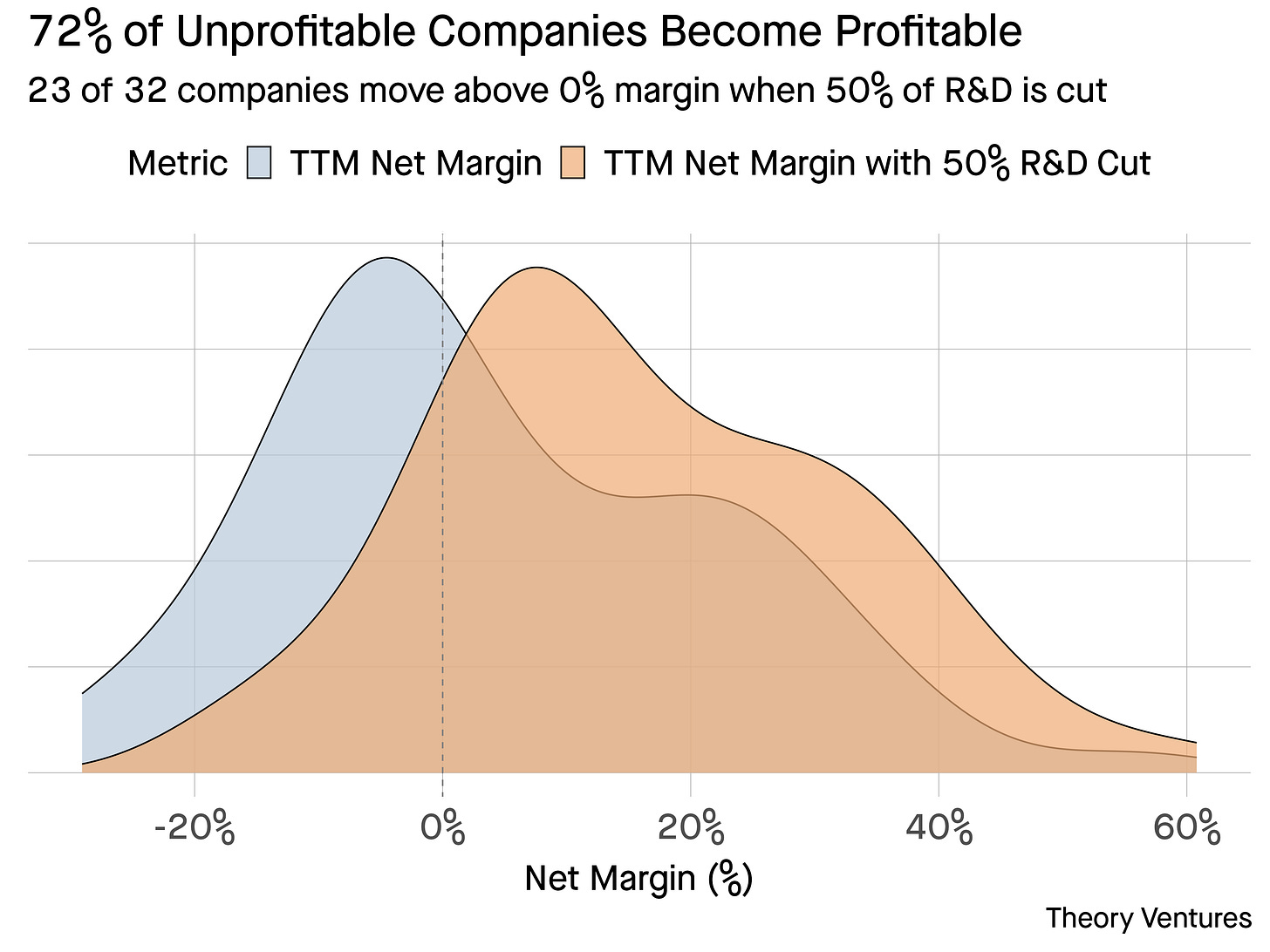AI is Reshaping Tech: Leaner Operations, Fewer Jobs, Faster Growth
We've hit a pivotal moment in tech: peak employment in the traditional sense is behind us, and companies must either get leaner or risk extinction.

The rise of AI and automation is driving this seismic shift, reducing the need for software engineers while redefining how innovation happens. Tech giants like Salesforce, Microsoft, Meta, and Google are leading the charge, betting on AI to do more with less. Meanwhile, venture capitalist Tom Tunguz's thought experiment, "What If You Cut R&D by 50%?" offers a lens to understand this trend, suggesting that drastic cost-cutting could boost profitability if paired with the right tools. In 2025, AI is proving to be that tool, turning Tunguz's hypothetical into reality.
AI is Eating Software Engineering Jobs
The employment landscape in tech is undergoing a structural overhaul, and the numbers tell a stark story. Job openings for software engineers in the US have plummeted to a five-year low, down over a third from pre-AI highs, according to Indeed. Why? Because AI is supercharging productivity, reducing the need for human coders across the board. Here's how the big players are adapting:
Salesforce: CEO Marc Benioff hinted they might not hire any software engineers in 2025. AI agents are working alongside current staff, delivering "incredible productivity gains," as Benioff put it. Why hire more when machines can pick up the slack?
Microsoft: Layoffs are looming in 2025, with engineering roles likely on the chopping block.
Meta: Mark Zuckerberg envisions AI replacing mid-level engineers by 2025, offloading chunks of the coding workload to algorithms.
Google: Sundar Pichai revealed that as of October 2024, AI writes over 25% of Google's new code. That's a massive shift, and it's only accelerating.
These aren't isolated moves. They're part of a broader trend. Companies are shedding their old skin and embracing automation to stay lean and competitive. Those that can't adapt? They're getting left behind. Over the weekend, there were a few LinkedIn posts about companies that can’t find their Series A. They’re structured based on yesterday’s playbook, and the effort to flip to the AI script must be too hard and/or too long for them to adapt.
From Job Losses to Strategic Efficiency
This isn't just about fewer jobs, it's about a fundamental rethink of how tech operates. Enter Tom Tunguz's thought experiment, where he asked: could SaaS companies cut R&D budgets by 50% and still thrive? His analysis suggested that for cash-burning firms, such a cut could flip them into profitability overnight. The trade-off? Innovation might stall, threatening long-term growth. In a pre-AI world, that risk loomed large. But today, AI is rewriting the equation.
Take Google's 25% AI-written code or Salesforce's productivity-boosting agents. These aren't cuts for the sake of cuts. They're strategic pivots. AI tools like Cursor, Windsurf, and Claude Code are letting lean teams punch above their weight, handling the grunt work (boilerplate code, optimization, prototyping) so humans can focus on big-picture innovation. Tunguz noted that redirecting R&D savings into growth could multiply enterprise value fivefold. In 2025, that means doubling down on AI to stay ahead, not just to survive.
AI: The New R&D Engine
Here's the kicker: AI isn't just a cost-cutter, it's an innovation enabler. Cutting R&D by 50% might have crippled companies a decade ago, but now it's a viable strategy. Why? Because AI handles the heavy lifting. A small, elite team paired with an army of AI assistants can iterate faster, experiment bolder, and ship smarter than a sprawling pre-AI R&D department ever could. It's not about doing less, it's about doing more with less. Companies aren't sacrificing their future; they're outsourcing the tedious stuff to machines and freeing up human creativity for what matters.
The Catch and the Opportunity
Of course, there's a flip side. Over-relying on AI risks homogenizing the tech landscape, everyone using the same tools could end up building the same products. Quality might slip if human oversight fades too far. But for now, the winners are clear: companies that pair AI efficiency with strategic human ingenuity are thriving.
While traditional software engineering roles are being rapidly redefined—and yes, some are vanishing. AI is unlocking a new frontier of tech careers. Think AI strategists shaping the future of automation, ethical overseers ensuring algorithms play fair, and innovators in roles so cutting-edge we haven’t even named them yet. It's a rough transition for many engineers, but the market's shifting, not collapsing. Look at the roles at companies like Anthropic, OpenAI, and Mistral.
The Bottom Line: Lean is the New Black
We're at peak employment in the old-school sense, and the future belongs to leaner, AI-powered teams. Tunguz's thought experiment asked if companies could survive a 50% R&D cut. In 2025, AI answers with a resounding "yes”, not by slashing innovation but by reimagining it.
Tom Tunguz, a heavyweight in the venture capital world, argues that software companies don’t get their valuation from profitability alone and he’s got a point. But the ground is shifting beneath our feet. These days, the chatter in the tech scene isn’t just about sky-high growth rates anymore; it’s buzzing with terms like EBITDA and the Rule of 40. Investors (institutional, PE, and VC) aren’t chasing the next rocket-ship startup with flashy chart. They’re demanding sustainable hustle (with rocketship growth). Growth only still turns heads if it’s not drowning in a sea of red ink.
Salesforce, Microsoft, Meta, and Google are living proof, cutting back on software engineers while pushing the envelope with AI. The Indeed data, job openings down over a third, confirms this isn't a blip; it's a new reality. AI's rewriting the rules: play smart, or get played

